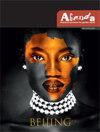Our Ubuntu: A Black feminist turn
IF 0.4
Q4 Arts and Humanities
引用次数: 0
Abstract
abstract Ubuntu has become a galvanising concept that brings African and Diasporic peoples into dialogue with one another and its aspirations for both. However, the space of the university and the prescriptions of academia often reflect colonial logics and engage in complex re-enactments or perpetuations of colonial erasure of Black female bodies, voices, and practices. Using our shared experiences of engaging Ubuntu at the Ubuntu Dialogues conference in Stellenbosch, South Africa, we experiment with the process of writing as a form of disruptive academic praxis of care work informed by spirituality, creative expression, and spatial embodiment. We engage in collective reflexiveness and writing on the exclusion of care practice in higher education and how Black feminists’ care subverts these subtle and overt forms of erasure of Black knowledge, contributions, work, practice, and intellectual thinking. Furthermore, a Black feminist ethics and poesis of care attends to the physical ableist heteronormative, patriarchal space that requires complicity in colonial violences. We show that inserting our voices and bodies into the work at the intersection of care, praxis, and knowledge generation is a collaborative act of care cultivation done by Black women for Black women and benefitting all peoples/bodies. Our reflective essay foregrounds care at the contours of a Black feminist conception of Ubuntu.我们的Ubuntu:黑人女权主义转向
本文章由计算机程序翻译,如有差异,请以英文原文为准。
求助全文
约1分钟内获得全文
求助全文

 求助内容:
求助内容: 应助结果提醒方式:
应助结果提醒方式:


